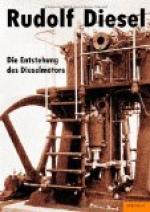|
This section contains 383 words (approx. 2 pages at 300 words per page) |
World of Invention on Rudolf Christian Karl Diesel
Rudolf Diesel was born in Paris, France, on March 18, 1858, the son of Bavarian Germans from Augsburg. At the outbreak of the Franco-Prussian War in 1870, the family was expelled from France and they moved to London. His father sent the young Diesel back to Augsburg to continue the education that he had begun in France. Diesel eventually found his way to the technical high school in Munich, where he excelled in engineering, passing his examinations with the highest marks on record.
In 1880, he went to work for the firm of his refrigeration professor, Karl Paul Gottfried von Linde. While an employee of the Linde firm, Diesel became fascinated with the theoretical work of the French physicist Nicholas Carnot (1796-1832), which presented the principles of the modern internal combustion engine. Diesel was convinced that an engine four times as efficient as a steam engine could be built by injecting fuel into an engine in which the piston compresses air in a ratio as great as 25 to 1. Such high compression causes the air to reach temperatures of nearly 1000° F (537° C), a temperature that is high enough to ignite the fuel without the need for complex spark ignition systems.
Rudolf Diesel worked on various designs for his engines for over a decade, and he was granted a patent in 1892 for an engine designed to burn the cheapest fuel then available--powdered coal. By 1897, Diesel abandoned powdered coal, substituting kerosene as the fuel. Diesel's engine proved to be very efficient, as his calculations showed it would be, but due to the restrictions he placed upon the manufacture of engines built under his patent, Diesel engines were very heavy and not suited to anything but stationary applications. Hence, early Diesel engines were not adapted to power the burgeoning automobile industry. Diesel engines did, however, find wide acceptance in the shipping and locomotive industries.
The diesel engine's high efficiency and comparatively simple design made it commercially successful, and its manufacture made Rudolf Diesel a millionaire. However, while crossing the English Channel on the way to consult with the British Admiralty, Diesel disappeared at sea on September 30, 1913. His body was never recovered and suicide is considered to have been a possible reason for his death as he was known to be emotionally unstable and given to occasional breakdowns.
|
This section contains 383 words (approx. 2 pages at 300 words per page) |


